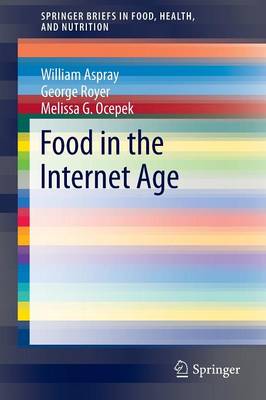SpringerBriefs in Food, Health, and Nutrition
2 total works
Food in the Internet Age
by William Aspray, George Royer, and Melissa G. Ocepek
Published 1 January 2013
This book examines food in the United States in the age of the Internet. One major theme running through the book is business opportunities and failures, as well as the harms to consumers and traditional brick-and-mortar companies that occurred as entrepreneurs tried to take advantage of the Internet to create online companies related to food. The other major theme is the concept of trust online and different models used by different companies to make their web presence seem trustworthy. The book describes a number of major food companies, including AllRecipes, Betty Crocker, Cook's Illustrated, Epicurious, Groupon, OpenTable, and Yelp. The book draws on business history, food studies, and information studies for its approach.
Formal and Informal Approaches to Food Policy
by William Aspray, George Royer, and Melissa G. Ocepek
Published 1 January 2014
Formal approaches are those taken by government bodies through laws, court decisions and actions of government regulatory bodies. Informal approaches are those taken by individuals, non profit organizations, industries working at self-regulation, etc. Because the formal means are tied to a particular legal system, this kind of approach is nation-specific and the book focuses on the United States. But many of the things the authors have to say about US food policy and the interactions between formal and informal approaches would also be of interest to policymakers and food industry professionals in other countries. Coverage includes the regulation of food advertising on children's television and the internet, regulation of school lunch programs and the influence of Eleanor Roosevelt and Michelle Obama.

